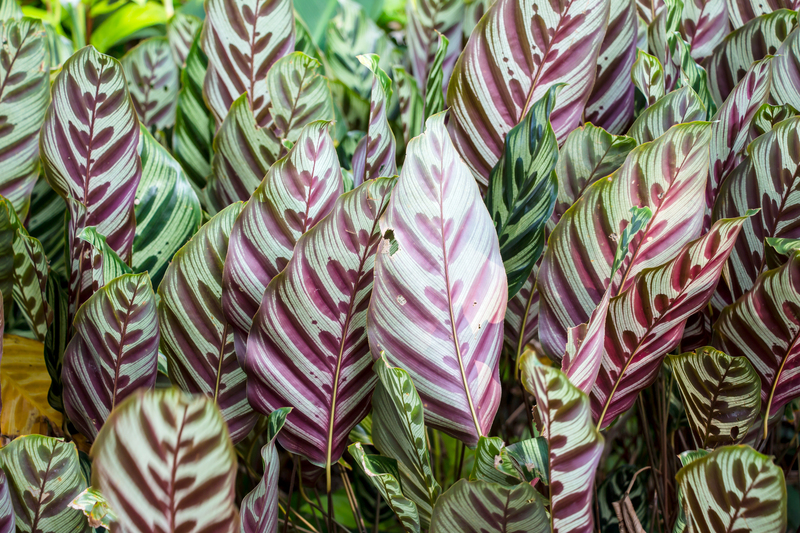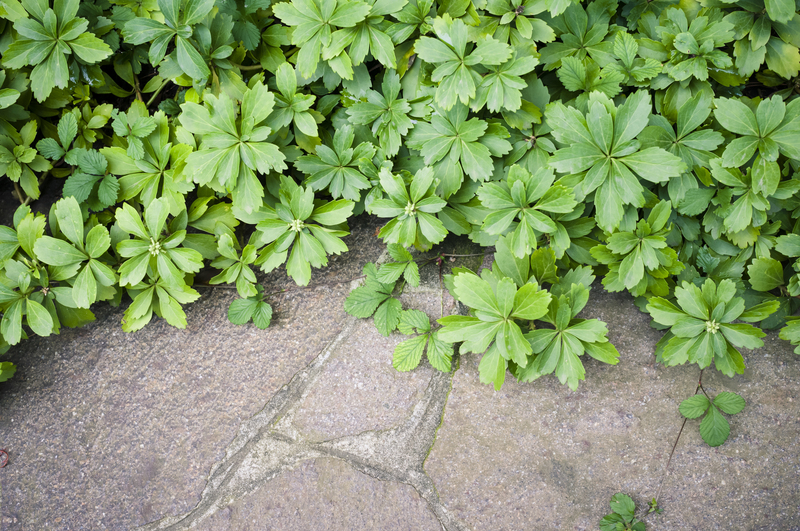Embrace Gardening to Forge a Greener Future
Posted on 30/08/2025
Embrace Gardening to Forge a Greener Future
In a rapidly industrializing world, the quest for a sustainable and greener future has never been more pressing. As climate change threatens ecosystems and urban environments expand, humanity must look towards practical and rewarding solutions. One such solution lies right at our fingertips: embracing gardening. This age-old practice has the power to reconnect us with nature, reduce our carbon footprint, and inspire communities. In this comprehensive article, we will explore how gardening fosters a greener, more sustainable world and how you can be part of this meaningful movement.
Why Embrace Gardening for a Sustainable Future?
Gardening is not just a pastime -- it's a movement that can transform the planet. When more people embrace gardening as a lifestyle, we unlock a wealth of ecological, social, and even economic benefits. The act of tending to plants, whether in a backyard, community plot, or even on a balcony, builds intimate connections between individuals and the environment.
Key Benefits of Gardening for the Planet
- Promotes Biodiversity: Gardens become sanctuaries for pollinators like bees and butterflies as well as native plants.
- Reduces Urban Heat: Plants provide shade and cool the air, helping lower temperatures in cities.
- Improves Air Quality: Leaves filter out pollutants and produce oxygen, leading to fresher urban environments.
- Mitigates Climate Change: Growing plants sequester carbon dioxide, one of the main drivers of global warming.
- Conserves Water: Smart gardening techniques such as mulching and drip irrigation help conserve precious water resources.
- Reduces Food Miles: Growing fruit and vegetables locally means less transport emissions and fresher produce.
Environmental Impact of Gardening
By embracing home gardening and community plots, communities can directly impact local ecosystems. Gardens serve as natural carbon sinks--plants absorb carbon dioxide during photosynthesis, storing carbon in their tissue and the soil. When native species are favored, the local fauna thrives, such as birds, butterflies, and other essential creatures.
Moreover, reducing the need for chemically-intensive agriculture through personal and local food production eases the pressure on farmland, decreases chemical runoff, and protects nearby ecosystems. The cumulative effect of many small gardens is profound, gradually moving society closer to a more harmonious relationship with nature.

How Gardening Contributes to Personal Well-Being
While the environmental benefits of gardening are immense, its impact on personal well-being is equally significant. As more people begin to embrace gardening and green spaces, mental and physical health improves on a community-scale.
Mental Health Benefits
- Stress Relief: Spending time with nature and plants helps reduce stress and anxiety.
- Physical Activity: Gardening tasks like digging, weeding, and planting keep the body active and healthy.
- Satisfaction: Watching your garden grow offers a sense of achievement and purpose.
- Mindfulness: Gardening encourages living in the moment, appreciating growth and change.
In schools and workplaces, gardens foster connections, encourage teamwork, and create outdoor spaces for relaxation and creativity. By forging a greener future through gardening, we are also nurturing happier, healthier communities.
Growing Your Own: Nutrition and Security
Raising your own vegetables, fruits, and herbs leads to more nutritious and diverse diets. Home-grown produce is often fresher and more flavorful, packed with vitamins and minerals. Knowing where your food comes from builds resilience and security, especially during times of supply chain disruptions or economic uncertainty.
- Control over Pesticides and Chemicals: You can choose to grow organic, chemical-free food.
- Variety: Home gardens allow for the growth of unique heirloom and heritage varieties not often found in stores.
- Seasonality: Eating what is in season reduces your carbon footprint and connects you to natural cycles.
Community Gardening: Building a Greener Society
A vital step toward forging a greener future is nurturing a culture of community gardening. Shared green spaces provide opportunities for neighbors to get involved, exchange knowledge, and foster a spirit of collaboration. Community gardens thrive in schools, urban neighborhoods, and even vacant lots, transforming unused areas into lush, productive hubs.
Social and Environmental Advantages of Community Gardens
- Education: Neighbors can teach each other gardening skills and sustainable practices.
- Food Security: Shared harvests help ensure fresh produce is available to everyone, often aiding those in need.
- Habitat Creation: Community plots are oases for wildlife, improving local biodiversity.
- Beautification: Green spaces uplift neighborhoods, boost pride, and deter crime.
- Climate Resilience: Collective planting of trees and shrubs helps reduce flooding, erosion, and heat impacts.
*Communities that embrace gardening for a greener tomorrow are more adaptable and better equipped to face environmental challenges.*
Gardening Techniques for a Sustainable Future
To truly forge a greener future, it's essential to apply gardening techniques that maximize environmental benefits while minimizing impacts. Here are some top sustainable gardening methods:
Organic Gardening Practices
- Composting: Convert kitchen scraps and yard waste into nutrient-rich compost that feeds soil and reduces landfill use.
- Mulching: A layer of mulch conserves moisture, suppresses weeds, and protects soil health.
- Natural Pest Control: Encourage beneficial insects, companion plants, and barriers to keep pests in check.
- Crop Rotation and Diversity: Rotate crops and plant a diversity of species to prevent diseases and nutrient depletion.
Efficient Water Use in the Garden
- Rainwater Harvesting: Collect rainwater for irrigation using barrels or underground tanks.
- Drip Irrigation Systems: Deliver water directly to roots to minimize waste and evaporation.
- Drought-Resistant Plants: Choose varieties suited for your climate to use less water.
By embracing innovative gardening techniques, individuals can drastically reduce resource use and environmental impact.
Native Plant Gardening
Another important step towards gardening for a greener future is choosing to grow native plants. These species are adapted to your region's soil, climate, and weather, requiring less water, fertilizer, and maintenance. They also provide essential habitat and food for native birds, insects, and wildlife.
- Support Local Fauna: Attract pollinators and support native wildlife
- Reduce Pesticide Use: Native plants typically suffer from fewer pests and diseases.
- Preserve Heritage: Maintaining native species helps protect regional plant biodiversity.
Technological Innovations in Gardening
Embracing modern technology can also play a pivotal role in gardening for a greener future. Innovations in gardening tools, apps, and platforms help make gardening easier and more accessible for everyone.
Smart Gardening Tools and Resources
- Planners and Apps: Digital tools help plan planting schedules, identify plant diseases, and track progress.
- Automated Irrigation: Timers and moisture sensors optimize water use.
- LED Grow Lights: Energy-efficient lights aid indoor gardening and reduce electricity use.
- Online Communities: Connect with fellow gardeners for knowledge sharing and collective action.
*Using technology to embrace gardening makes it more efficient, motivating, and inclusive for people of all backgrounds and abilities.*
How to Start Gardening and Make an Impact
You don't need an enormous yard or professional-level skills to make a difference. **Starting a garden** can be quite simple and incredibly rewarding. Follow these steps to embrace gardening for a greener planet:
- Assess Your Space: Even small patios, balconies, or window sills can support plants.
- Start Small: Begin with a few pots or a raised bed, choosing easy-to-grow plants.
- Go Organic: Opt for organic seeds and soils to keep your garden chemical-free.
- Compost: Set up a small compost bin for kitchen scraps and yard waste.
- Educate Yourself: Read gardening books, watch tutorials, or join local gardening clubs.
- Invite Nature: Add a bird feeder or insect hotel to attract pollinators.
- Share: Exchange seeds, plants, and tips with neighbors or friends to build community.
By taking these first steps, you can embrace the joy of gardening and help forge a greener tomorrow.

The Future of Gardening: Urban and Vertical Solutions
As more cities look for ways to embrace gardening and sustainability, urban environments are evolving. The rise in urban gardening and vertical gardens brings green spaces to apartments, rooftops, and commercial spaces.
The Promise of Urban and Vertical Gardens
- Maximize Space: Vertical gardens utilize walls and fences, bringing greenery to high-density areas.
- Improve Air Quality: Living walls trap dust and pollutants, further cleaning the city air.
- Increase Access to Food: Rooftop groves and vegetable gardens provide fresh produce in food deserts.
- Inspire Innovation: Urban gardening sparks creative solutions for integrating nature into our daily lives.
With advances in hydroponics, aeroponics, and modular design, literally anyone can embrace the power of gardening--whether on a small windowsill or a soaring city tower.
Conclusion: Forging a Greener Future Together
Embracing gardening is about more than sowing seeds -- it's about cultivating a culture of care, stewardship, and active participation in the health of our planet. Each individual who chooses to garden contributes to a powerful, collective movement towards a more sustainable and resilient world.
As we embrace gardening to forge a greener future, we clean the air, nourish our communities, safeguard biodiversity, and reconnect with the natural cycles of life. Whether you have acres of land or a single plant on your windowsill, your actions are valuable. Let us nurture our gardens, our communities, and our hope for a better tomorrow, together.
Start your gardening journey today and help shape a greener, healthier future for all.
Latest Posts
Creating a Zen Oasis for Tranquil Outdoor Retreats
Creating a Dog-Friendly Garden: Tips and Tricks
Mastering the Art of Orchid Care



